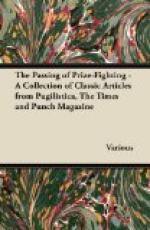7. If middle-aged gentlemen are musical or political, they can dislocate a tune in something between a bark and a grumble, or endeavour to provoke an argument by declaring very loudly that Lord R—— or the Duke “is a thorough scoundrel,” according to their opinion of public affairs. If this don’t take, they can keep up a perpetual squabble with the conductor, which will show they think themselves of some importance.
8. Ladies wishing to be agreeable can bring lap dogs, large paper parcels, and children, to whom an omnibus is a ship, though you wish you were out of their reach.
9. Conductors should particularly aim to take up laundresses returning with a large family washing, bakers and butchers in their working jackets, and, if a wet day, should be particular not to pull up to the pathway.
10. For want of space, the following brevities must suffice:—Never say where you wish to stop until after you have passed the place, and then pull them up with a sudden jerk. Keep your money in your waistcoat-pocket, and button your under and upper coat completely, and never attempt to get at it until the door is opened, and then let it be nothing under a five-shilling piece. Never ask any one to speak to the conductor for you, but hit or poke him with your umbrella or stick, or rap his hand as it rests on the door. He puts it there on purpose. Always stop the wrong omnibus, and ask if the Paddington goes to Walworth, and the Kennington to Whitechapel: you are not obliged to read all the rigmarole they paint on the outside. Finally, consider an omnibus as a carriage, a bed, a public-house, a place of amusement, or a boxing-ring, where you may ride, sleep, smoke, chaff, or quarrel, as it may suit you.
* * * * *
PETER THE GREAT (FOOL?)
The following colloquy occurred between a candidate for suicidal fame and the City’s Peter Laureate:—
“So, sir, you tried to hang yourself, did you?”
“In course I did, or I should not have put my head in the noose.”
“You had no business to do so.”
“I did it for my pleasure, not for business.”
“I’ll let you see, sir, you shan’t do it either for fun or earnest.”
“Are you a Tory, Sir Peter?”
“A Tory, sir! No, sir; I’m a magistrate.”
“Ah, that’s why you interfere; you must be a low Rad, or you wouldn’t prevent a man from
[Illustration: DOING WHAT HE LIKES WITH HIS HONE.”]
* * * * *
THE WISE MAN OF THE EAST.
SIR PETER LAURIE begs Punch to inform him, which of Arabia’s Children is alluded to in Moore’s beautiful ballad,
“Farewell to thee, Araby’s daughter.”
He presumes it is Miss Elizabeth, commonly called Bess-Arabia.
* * * * *




